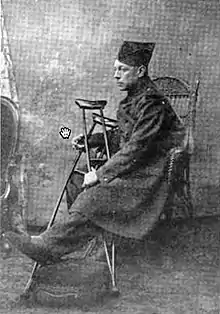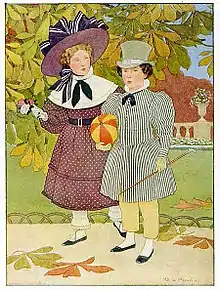Roger Boutet de Monvel
Roger Boutet de Monvel (4 December 1879 – 25 December 1951)[1] was a French writer of historical studies and magazine articles on fashion and other topics.
Roger Boutet de Monvel | |
|---|---|
 Roger Boutet de Monvel recuperating from injuries received in the trenches of World War I, late 1915 | |
| Born | 4 December 1879 Paris (France) |
| Died | 25 December 1951 (aged 72) Paris (France) |
| Nationality | French |
| Occupation | Writer |

Biography
Born in the 4th arrondissement of Paris,[1] Roger Boutet de Monvel was the oldest son of Maurice Boutet de Monvel (1850–1913), a painter and illustrator of children's books.[2] His brother was Bernard was also an artist.[2] He was raised in Paris and in Nemours, where his maternal grandparents owned a house.[3]: 34–35 He often served as a model for his father; for example, his silhouette appears in his father's illustrations for Anatole France's Nos enfants, which also has an entire chapter about him.[3]: 33
After he finished his education, Boutet de Monvel took a position as secretary to the director of the Imprimerie nationale.[2] He began publishing articles in the early 1900s, at first usually in collaboration with his father or brother.[3]: 75 His first major work, a historical study entitled Les variétés (The Variety Shows), was published in 1905 by Plon, which would remain his publisher for most of his career.[2] Later historical studies took as their themes the upper social classes of France, the life of St. Francis of Assisi, and the writers Lord Byron and Miguel de Cervantes.[2]
In 1911, he took a job at the Carnavalet Museum in conservation.[2]
He joined the armed forces during the First World War but was discharged early on due to a leg injury.[2] Beginning in 1917, he published several books with war-related themes, including Carnet d'un permissionnaire (Notebook from a Soldier on Leave, 1917), Le bon anglais (The Good Englishman, 1918) and Nos frères d'Amériques (Our American Brothers, 1918).[2]
Something of a dandy,[2] Boutet de Monvel was engaged with the fashion industry in various ways. In 1912, he began writing for the Gazette du Bon Ton, a leading fashion magazine of the day, and shortly became a regular contributor.[2] In 1915 he attended the Panama–Pacific International Exposition in San Francisco as a representative from the French fashion industry.[2] The following year, he wrote promotional copy for designer Paul Poiret.[2] After the war, he returned to writing about fashion in Gazette du Bon Ton as well as in magazines like Vogue, Harper's Bazaar, and Monsieur.[2]
He died in the 8th arrondissement of Paris on Christmas Day 1951.[1] He left a set of unpublished memoirs that he had been working on since the late 1930s.[2]
Works
- "Children's Costumes in the Nineteenth Century", Century Magazine, 1904; with illustrations by Maurice Boutet de Monvel
- Les Variétés (The Variety Shows), 1905
- Georges Brummel and Georges IV, 1906. Translated as: Beau Brummel and His Times, 1908
- Les anglais à Paris, 1911. Translated as: Eminent English Men & Women in Paris, 1912
- Carnet d'un permissionnaire (Notebook from a Soldier on Leave), 1917
- Le bon anglais (The Good Englishman), 1918
- Nos frères d'Amériques (Our American Brothers), 1918
- Grands seigneurs et bourgeois d'Angleterre (The Great Lords and Bourgeoisie of England), Plon Publishers, 1918
- Une vie de Saint François d'Assise (Life of Saint Francis of Assisi), 1921; with illustrations by Maurice Boutet de Monvel
- La vie de Lord Byron (Life of Lord Byron), 1924
- La vie martial du Bailli de Suffren (The Martial Life of Bailli de Suffren), 1929
- Cerventès et les enchanteurs, 1933. Translated as: Cervantes and the Magicians, 1934
- Pérou et Chile (Peru and Chile), 1937
References
- "Archives numérisées - Paris.fr". canadp-archivesenligne.paris.fr. Retrieved 12 April 2015.
- Addade, Stéphane-Jacques. "Roger Boutet de Monvel". Stéphane-Jacques Addade website.
- Addade, Stéphane-Jacques. Bernard Boutet de Monvel. Paris: Editions de l'Amateur, 2001.